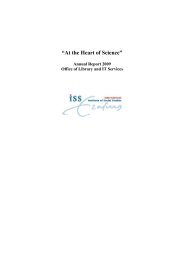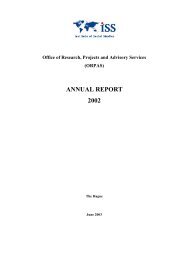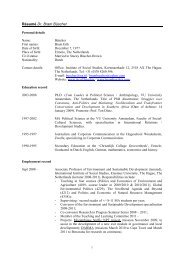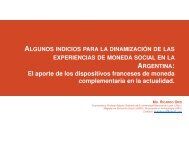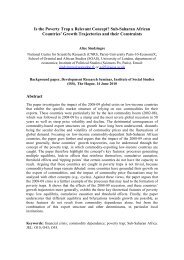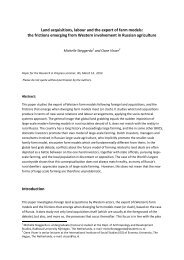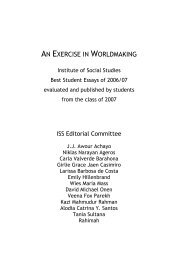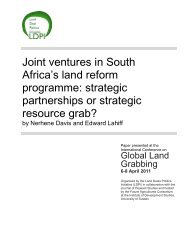AN EXERCISE IN WORLDMAKING 2009 - ISS
AN EXERCISE IN WORLDMAKING 2009 - ISS
AN EXERCISE IN WORLDMAKING 2009 - ISS
Create successful ePaper yourself
Turn your PDF publications into a flip-book with our unique Google optimized e-Paper software.
192 TARA TABASSI<br />
that assumed of the Orient. In the context of development, ‘timestanding-still-at-the-precipice-of-change’<br />
connotes the ability of development<br />
practitioners to sweep in, making claims despite changing realities<br />
(Roe 1989:4).<br />
Judgment of her physique ensues: ‘time and hardship have erased her<br />
youth.’ The author reduces natural aging processes not only to time but<br />
to hardship, and diminish her by equating it to ‘erasure’. Gula is dehumanized;<br />
‘her skin looks like leather.’ This is reinforced: ‘the eyes still<br />
glare. That has not softened,’ as if the intense look caught in 1985 will<br />
permanently render her a hardened woman. ‘She has had a hard life,’<br />
states McCurry in an authoritarian role as arbiter of beauty.<br />
The paragraph concludes by demanding reflection: ‘Now, consider…<br />
a young girl with sea green eyes. Her eyes challenge ours. Most of all,<br />
they disturb. We cannot look away.’ This effective questioning of readers’<br />
thoughts and its strategic timing implies another level of interaction -<br />
- perhaps one of U.S. intervention in order to save… Afghan women…<br />
like Gula?<br />
Aggressive description of Gula’s plight continues metaphorically:<br />
‘jaws of soviet invasion’ and imagery of airplanes ‘stabbing her with<br />
dread.’ Dehumanizing metaphors describe Gula’s nameless brother’s<br />
‘raptor face’ with ‘piercing eyes’ who speaking for Gula, ‘fill[s] in the narrative<br />
of her life,’ and plays into negative representations of Afghani<br />
males.<br />
An apparently ‘respected’ (therefore authoritative), named Pakistani<br />
journalist, Yusufzai, explains Gula’s experience, apologizing for Sharbat,<br />
and how she ‘live[s] at the mercy of the politics of other countries,’ hinting<br />
at the U.S. There is no mention or critique of U.S. involvement in<br />
the article. Only present and future instability: ‘It is the ongoing tragedy<br />
of Afghanistan. Invasion. Resistance. Invasion. Will it ever end?’, suggesting<br />
need for a larger Hero. With that helpless tone, the author returns<br />
to Gula and describes her life as ‘means to scratch out an existence,<br />
nothing more,’ following dominant discourses of poverty as bland unfulfilling<br />
livelihoods. Hey day’s ‘bare outline’ is described for her, as though<br />
only a skeleton of a ‘real’ day’ – presumably those of cosmopolitan lives<br />
filled with thoughts and opportunities. Gula’s life is apparently quite the<br />
opposite, thoughtless and hopeless: ‘she cooks… cleans… does laundry.<br />
She cares for her children: the centre of her life.’ Her brother again<br />
speaks for her, ‘Sharbat has never known a happy day…except perhaps



